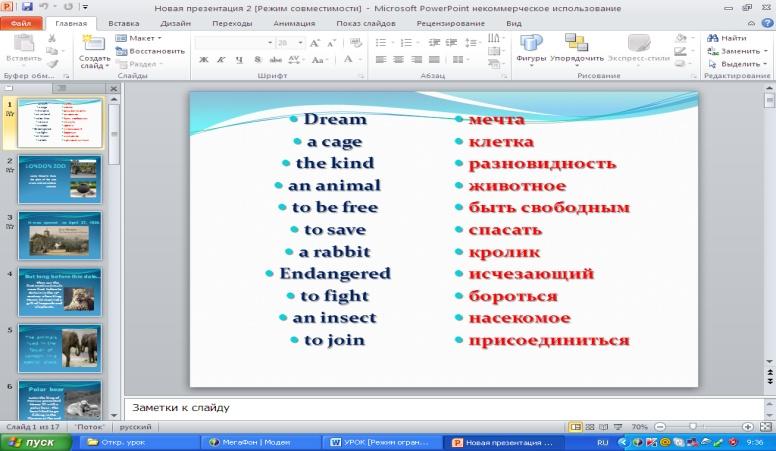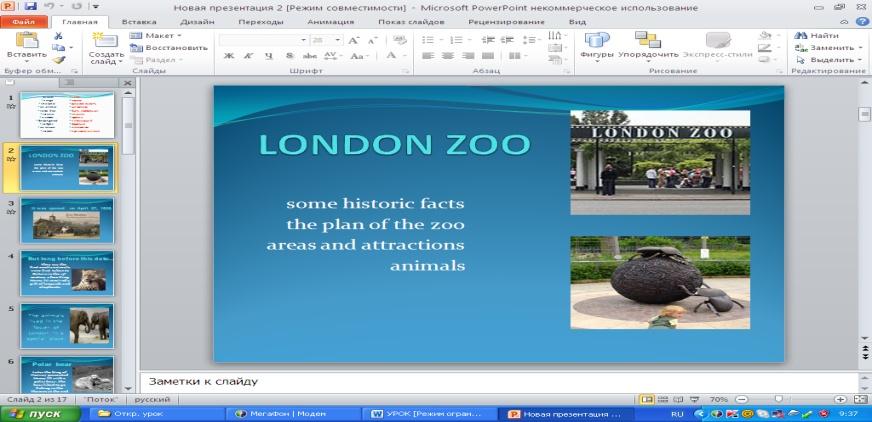« Животные в нашей жизни».
2) Организовать говорение по теме «Лондонский зоопарк» на базе текста.
3) Организовать выполнение письменного упражнения на базе текста.
| Этапы урока | Деятельность учителя | Деятельность учащихся | Примечание |
| 1. Организационный момент | Good morning, boys and girls. It’s very nice to meet you. Sit down, please. 1. What date is it today? 2. What day of the week is it today? 3.Who is absent? | Good morning, teacher!
1. Today is the 9th of November. 2. Today is Friday. 3. All are present. |
|
| 2. Фонетическая зарядка | 1) We have an unusual lesson today; it’s an excursion to London Zoo. During our excursion you will know about the history of the Zoo. You should be very attentive because at the end of the excursion you should make your own investigation and tell me about London Zoo. But before it let’s warm up our tongues. 2) Ok. Let’s play a little with these words. You should work in groups. I will give you cards and you should find a Russian pair to each of these words. Every group has its own words.(слайд 1) 
3) Well done. Now find the rhyme in your books on page 107 ex 14 | 1) Слушают и повторяют слова за учителем, хором, по цепочке, по одному.
2) Учащиеся работают в группе и подбирают пару каждому слову. Затем один из учащихся группы зачитывает подобранные пары.
3) Слушают рифмовку и повторяют за учителем |
|
| 3. Речевая зарядка. | So, we are going to visit London Zoo. First tell me Do you like animals? Where can you see animals? Do you like to go to the Zoo? Can you feed animals at the Zoo? (слайд2) 
| Учащиеся отвечают на вопросы учителя. |
|
| 4. ПроверкаД.З. | Let’s check your homework. At home you should imagine you work at London Zoo and tell what animals you are taking care of. Give some information about them. | Учащиеся представляют себя работниками зоопарка и рассказывают, о каких животных они заботятся. |
|
| 5. Активизациялексическихнавыков. | 1) For entering the zoo, you need a ticket. Name any animal and receive the ticket. 2) Let’s start our excursion from watching the slides about the history of the zoo and reading the text about London Zoo. Be very attentive because my report will help you to make your investigation (слайд 3 – 16). 













| 1) Называют животное и получают билет.
2) Читают предложения об истории зоопарка.
|
|
| 6. Работа с текстом. | Open the page 106 ex. 10 and Let’s find out if everything about London Zoo is clear for you. 1) You have cards. Read every sentence and tell me is it True or False. a) London Zoo was opened on April 27, 1938 b) Exotic animals were first taken in the 14th century c) The animals lived in the Tower of London d) Queen Charlotte was given the first zebra e) Giraffes arrived to London Zoo in 1839 2) Now look at the text again. When we were speaking about London Zoo, one giraffe left his place and ate some pieces of my paper with my text about the zoo. Please, help me to complete it! (слайд 17) 
|
1) Читают предложения и говорят верно, оно или нет.
a) False
b) False
c) True
d) True
e) True
2) Учащиеся читают текст и вставляют недостающую информацию. |
|
| 7. Развитие умения говорения. | Now I want you to be the detectives. Work in groups again. The first group is a detective group of Miss Marple, the second – is a detective group of Hercules Poirrot, and the third – of Sherlock Holmes. You have 3 minutes to make your own investigation. Sum up all the information about the zoo, using the slides and the text, and try to tell as much as you can about London Zoo.
| Учащиеся, представляя себя в роли детективов, собирают информацию о Зоопарке и составляют свои рассказы, используя полученную информацию на уроке. |
|
| 8. Подведение итогов экскурсии.
| Our excursion is coming to the end. You are very clever children and you worked hard today. Thank you very much. It was interesting working with you. |
|
|
| 9. Рефлексия.
| I want to know your opinion about our excursion. Take your tickets and write down what you think about it: Is it unusual, interesting, exciting, boring, uninteresting…? And give them to me. | Учащиеся берут свои билеты в зоопарк и пишут свое мнение об экскурсии, затем передают учителю. |
|
| 10. Д.З. | Open your diaries and write down you hometask for the next lesson. Ex. 10 p.106-107 (retell the text). Now the lesson is over, good-bye! | Записывают домашнее задание на следующий урок.
Good-bye! |
|

































